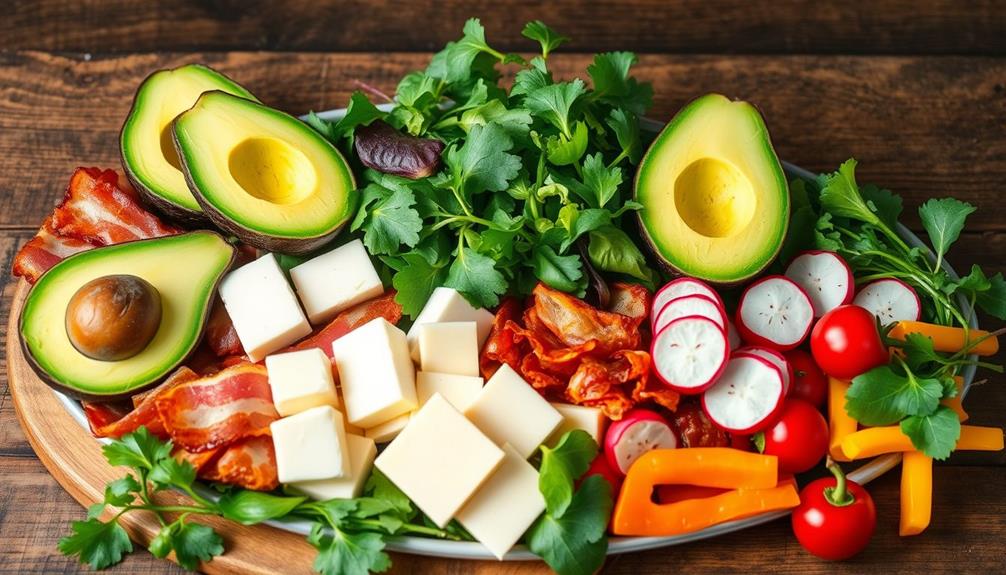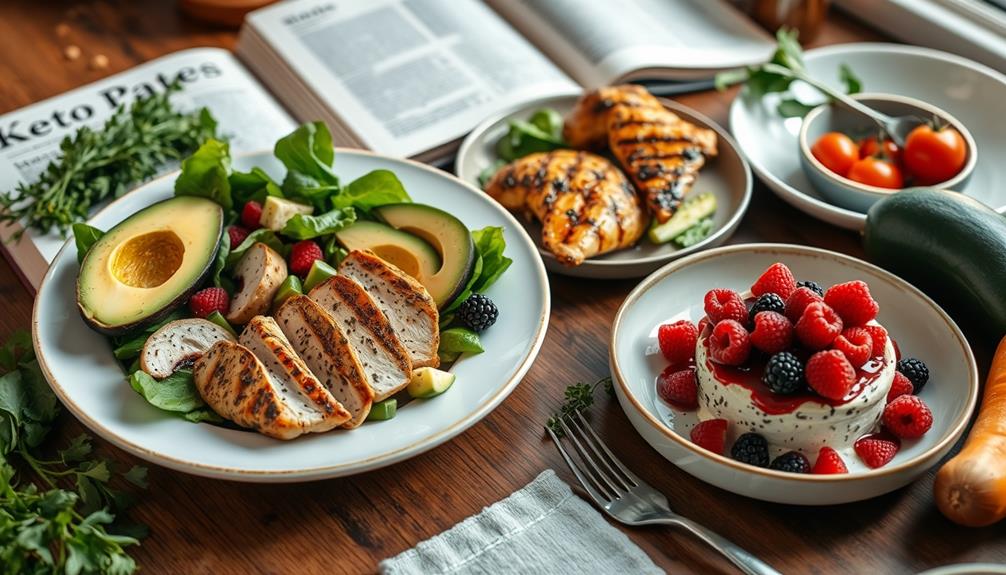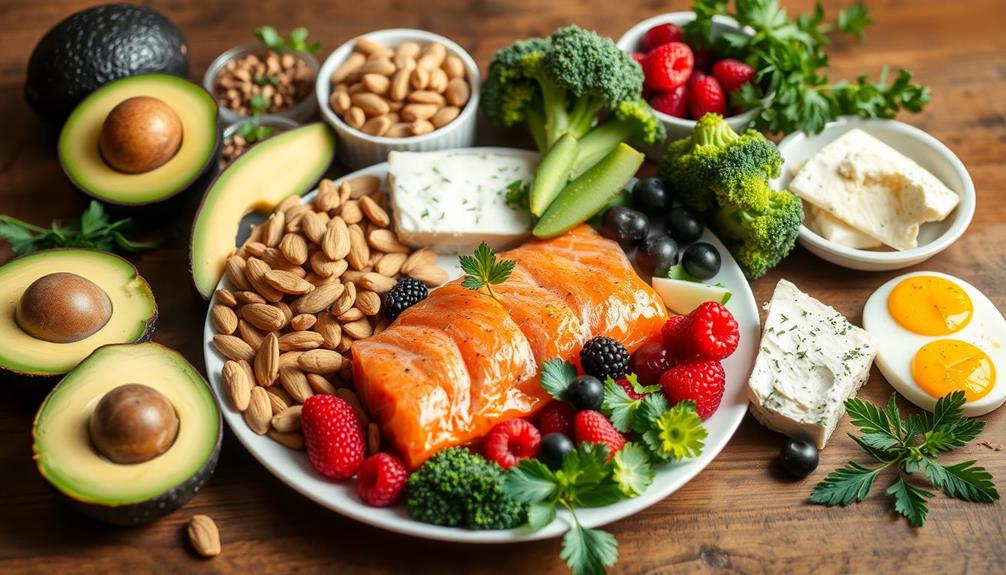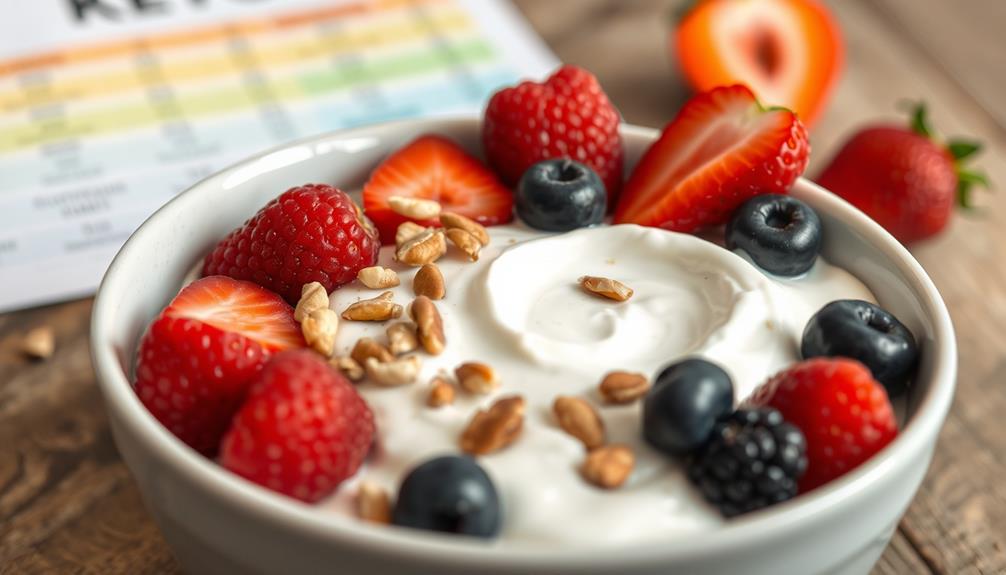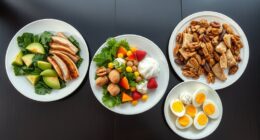On a keto diet, you can eat a range of tasty, low-carb foods. Focus on animal proteins like beef, chicken, and eggs, which have zero carbs. Include fatty fish like salmon and plenty of low-carb vegetables, such as spinach and cauliflower. Healthy fats are key, so don't skip olive oil, butter, or avocado. You can also enjoy dairy, like cheese and full-fat yogurt. Nuts, seeds, and certain low-carb fruits like berries make great snacks. Plus, stay hydrated with water or herbal teas. For more options and ideas, there's plenty more waiting for you to explore. There are also plenty of delicious recipes for keto-friendly desserts, using alternative sweeteners like stevia or erythritol. If you’re looking for a beverage to accompany your meals, there are many lowcarb beverage options to choose from, such as unsweetened almond milk, sparkling water, or black coffee. With a little creativity and exploration, you can enjoy a wide variety of satisfying and nutritious foods while following a keto diet.
Key Takeaways
- Focus on animal proteins like meat, poultry, eggs, and fatty fish for high-quality, low-carb nutrients.
- Incorporate low-carb dairy options such as cheese, Greek yogurt, and heavy cream to enhance flavor and satiety.
- Use healthy fats like olive oil, coconut oil, and butter, which should comprise 70-80% of your calorie intake.
- Choose non-starchy vegetables like spinach, cauliflower, and zucchini for nutrient density while keeping carbs low.
- Enjoy low-carb fruits like berries and avocados in moderation to maintain ketosis while adding variety to your diet.
Animal Proteins

Animal proteins are crucial for your ketogenic diet, offering high-quality protein without any carbohydrates. These proteins help you maintain muscle mass while keeping your carb intake low. Options like meat and poultry, including chicken, beef, and pork, are loaded with high-quality protein and contain zero carbs, making them perfect choices for promoting fullness and satisfying your hunger.
Additionally, incorporating high-fat dairy products like cheese and Greek yogurt can enhance your nutrient intake. Cheese usually contains less than 1 gram of carbs per ounce and delivers both calcium and protein benefits. It's important to remember that high-quality animal proteins can also provide beneficial nutrients, such as omega-3 fatty acids found in seafood, which are crucial for overall health rich in antioxidants.
Eggs are another fantastic staple; each large egg has less than 1 gram of carbs and provides essential nutrients that support your health. Incorporating eggs into your meals can help you feel satisfied while staying within your keto guidelines.
Additionally, high-fat dairy products like cheese and Greek yogurt can enhance your nutrient intake. Cheese usually contains less than 1 gram of carbs per ounce and delivers both calcium and protein benefits. Don't forget about the benefits of omega-3 fatty acids found in some animal proteins, which are crucial for overall health. While seafood is a great source, you can also obtain these fatty acids from quality meats.
Seafood Options

Seafood offers a fantastic array of options for those on a ketogenic diet, providing nearly carb-free choices packed with vital nutrients. Fatty fish, like salmon and mackerel, are particularly beneficial due to their high omega-3 fatty acids, which support brain health and reduce disease risks.
Additionally, incorporating seafood into your diet can help manage inflammation, an essential aspect for maintaining overall health, especially when considering the importance of selecting the right cold medication to avoid complications like illness. A 3-ounce serving of salmon contains 0 grams of carbs, 21.6 grams of protein, and 6.91 grams of fat, making it a nutrient-dense option that fits perfectly into your keto meal plan.
Don't overlook shellfish, either! Shrimp and crab are also low in carbs; for example, shrimp has about 1 gram of carbs per 3-ounce serving while being rich in protein and essential minerals like zinc and selenium.
When you include seafood in your diet, always track the carb content of different shellfish varieties, as they can differ greatly. Aim for a weekly intake of 8-10 ounces to maximize the benefits of seafood on your ketogenic diet.
Dairy Choices
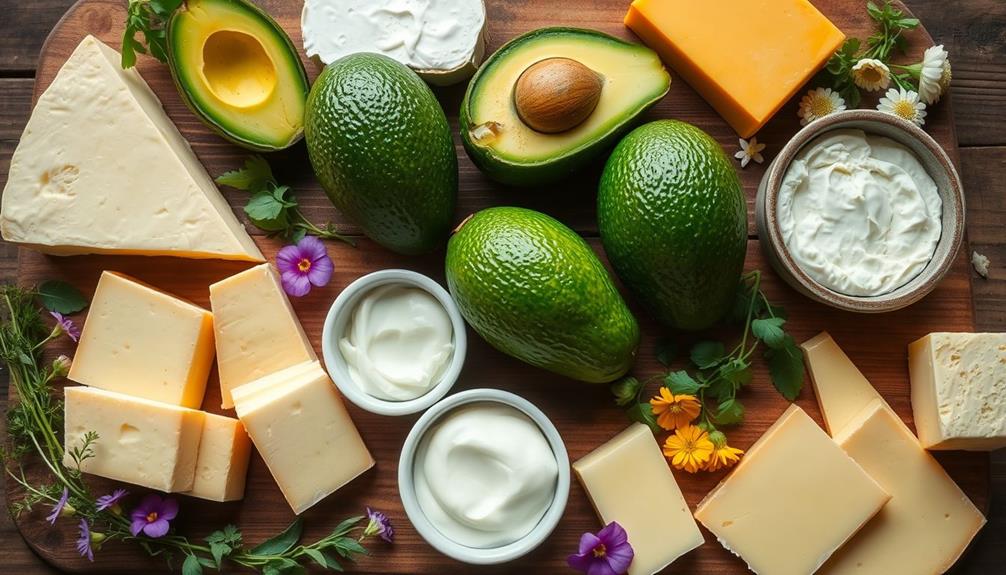
When it comes to dairy choices on a keto diet, opting for low-carb, high-fat options is key.
Full-fat products like cheese, Greek yogurt, and cottage cheese not only help you stay satisfied but also keep your carb intake in check.
Incorporating healthy fats can also support overall wellness, similar to how essential oils can aid health.
Just remember, moderation and portion control are vital to maintain your ketogenic goals.
Low-Carb Dairy Options
For those embracing the ketogenic lifestyle, low-carb dairy options can be a delicious and satisfying addition to your meals. Incorporating these choices not only enhances your dishes but also helps you stay within your carbohydrate limits while providing essential protein.
Understanding the mechanics of brewing methods can also complement your keto journey, especially when enjoying coffee, a popular beverage that can fit well within a low-carb diet.
Here are some great low-carb dairy options to deliberate:
- Plain Greek Yogurt: With around 8 grams of carbs and 20 grams of protein per 7-ounce serving, it's a tasty way to add creaminess. Just remember to monitor portion sizes!
- Full-Fat Cottage Cheese: This option offers approximately 6 grams of carbohydrates and a whopping 28 grams of protein in an 8-ounce serving, helping to satiate your hunger.
- Heavy Cream: Containing only 0.4 grams of carbs per tablespoon, it's perfect for coffee or recipes, raising your fat intake without considerably increasing carbs.
Other options like cream cheese, with about 1 gram of carbs per ounce, can also be a versatile ingredient in your ketogenic diet.
High-Fat Dairy Benefits
Incorporating high-fat dairy into your ketogenic diet offers numerous benefits that can enhance both your meals and overall health. High-fat dairy products like cheese and full-fat yogurt are excellent sources of protein, keeping you satiated while maintaining a low carb count. For instance, cheddar cheese boasts just 1 gram of carbs per ounce, making it a smart choice for your keto lifestyle.
Additionally, these dairy options can complement a balanced diet rich in fruits, vegetables, and whole grains, providing essential nutrients while you enjoy your keto journey. Full-fat Greek yogurt provides around 20 grams of protein and only 8 grams of carbs per 7-ounce serving, supporting muscle maintenance effectively.
Moreover, options like cream and half-and-half are low in carbs, with cream containing about 0.4 grams of carbs per tablespoon, perfect for coffee or cooking. Regular consumption of high-fat dairy has been linked to improved heart health and reduced muscle mass loss, as cheese contains conjugated linoleic acid (CLA), known for its potential fat loss benefits.
Incorporating these high-fat dairy options into your meals not only boosts the flavor and texture of your dishes but also makes adhering to the ketogenic diet more enjoyable. Enjoy your cheese and yogurt guilt-free while reaping the health rewards!
Moderation and Portion Control
Moderately enjoying dairy while following a ketogenic diet is essential to maintaining your carb limits and overall health. High-fat dairy options are your best bet, as they provide the necessary nutrients while keeping your carbohydrate intake low.
It's important to be mindful of portion sizes to avoid exceeding your daily carb limit; for example, safe snacks for hamsters can also offer insights into moderation.
To stay on track, consider these choices:
- Cheese: With options like cheddar and blue cheese containing less than 1 gram of carbs per ounce, you can indulge without guilt.
- Greek Yogurt: A 6-ounce serving of plain Greek yogurt has about 8 grams of carbs and 20 grams of protein, making it a solid choice when consumed in moderation.
- Heavy Cream: This creamy addition has less than 1 gram of carbs per tablespoon, perfect for enhancing flavor in your dishes.
Healthy Fats

Healthy fats are a cornerstone of your keto diet, giving you the energy you need while keeping your carb intake in check.
Incorporating oils such as olive or avocado not only enhances the flavor of your dishes but also provides essential nutrients that can support skin health, similar to how carrier oils for essential oils are important for skin safety.
Essential Fat Sources
Embracing essential fat sources is crucial for anyone following a ketogenic diet, as these fats deliver the majority of your daily energy needs. Healthy fats typically make up 70-80% of your total calories, ensuring you maintain energy intake while keeping net carbs low.
Butter, particularly butter basics, is a delicious and versatile option that can add richness and flavor to your meals. Here are some fantastic options to evaluate:
- Olive oil: This top choice is rich in oleic acid and antioxidants, with around 14 grams of fat and zero carbs per tablespoon.
- Coconut oil: Packed with medium-chain triglycerides (MCTs), this oil promotes ketone production, providing 14 grams of fat per tablespoon.
- Avocados: Offering both healthy fats and fiber, a medium avocado contains about 21 grams of fat and only 2 grams of net carbs.
Additionally, don't overlook butter, especially grass-fed varieties. With roughly 12 grams of fat per tablespoon, it's low in carbs and enhances satiety and flavor in your dishes.
Cooking With Healthy Oils
Cooking with healthy oils is a vital aspect of the ketogenic diet, as they provide a concentrated source of fat without adding any carbohydrates. These oils not only support energy levels and hormone production but also enhance the flavor of your meals.
Among the best options are olive oil and avocado oil, celebrated for their health benefits. Olive oil is rich in oleic acid and polyphenol antioxidants, which promote heart health and reduce inflammation. On the other hand, coconut oil, packed with medium-chain triglycerides (MCTs), boosts ketone production for quick energy—a perfect fit for your keto diet.
When cooking at high temperatures, you'll want to choose stable oils like avocado oil and ghee. They maintain their nutritional integrity and don't break down easily. Additionally, incorporating these healthy oils helps with the absorption of fat-soluble vitamins (A, D, E, K) from your food.
| Oil Type | Benefits | Best Uses |
|---|---|---|
| Olive Oil | Heart health, reduce inflammation | Salad dressings, drizzling |
| Avocado Oil | Stable oil, high smoke point | High-heat cooking |
| Coconut Oil | Medium-chain triglycerides | Baking, frying |
Vegetables to Include

When following a keto diet, including nonstarchy vegetables is essential for maintaining your health and staying within your carb limits. These veggies are low in net carbs and packed with nutrients, making them the perfect addition to your meals.
Individuals with emotional dysregulation may benefit from a balanced diet, as proper nutrition can support overall mental health and well-being, especially during challenging times BPD symptoms and management.
Here are some top choices to evaluate:
- Spinach: A versatile leafy green, rich in vitamins and minerals.
- Cauliflower: Great for ricing or mashing, it contains only about 3 grams of net carbs per cup.
- Zucchini: Perfect for spiralizing into noodles or adding to stir-fries.
Other excellent options include kale, broccoli, and bell peppers. Dark leafy greens like Swiss chard and collard greens are also nutrient-dense and provide essential antioxidants while keeping your carb intake low.
Incorporating a variety of colorful low-carb vegetables not only enhances your meals' nutrient profile but also adds flavor and texture without greatly increasing carb intake.
Nuts and Seeds

Nuts and seeds are essential components of a keto diet, providing healthy fats, fiber, and protein that help you stay satisfied between meals. These low-carb snacks are perfect for maintaining your energy levels while keeping your carb intake in check.
Healthy Dog Snacks can also be a great way to treat your furry friends while ensuring they receive the nutrients they need. For instance, almonds pack about 6 grams of carbs, 14 grams of fat, and 6 grams of protein per ounce, making them a favorite among keto dieters.
Chia seeds are particularly beneficial; although they contain around 12 grams of carbs per ounce, a whopping 10 grams of that's fiber, resulting in just 2 grams of net carbs. This makes them a fantastic choice for your meals.
Walnuts are another excellent option, offering approximately 4 grams of carbs, 18 grams of fat, and 4 grams of protein per ounce. Plus, they're a rich source of omega-3 fatty acids, which are essential for heart health.
You can easily incorporate nuts and seeds into your diet by adding them to salads, smoothies, or even enjoying them with a bit of dark chocolate. With their rich nutrient profile, nuts and seeds can elevate your keto meals and keep you feeling full.
Low-Carb Fruits

Low-carb fruits are a delicious way to satisfy your sweet cravings while staying within your keto limits. These fruits not only allow you to indulge but also provide essential nutrients. Here are some great options to explore:
- Strawberries, raspberries, and blackberries: Each contains fewer than 8 grams of net carbs per cup, making them ideal for keto dieters in moderation.
- Avocados: With about 2 grams of net carbs per half fruit, avocados are packed with healthy fats and fiber, offering heart health benefits.
- Watermelon: At approximately 11 grams of net carbs per cup, its high water content allows you to enjoy it in moderation without breaking your carb bank.
Other low-carb options include lemons and limes, which have around 3-4 grams of net carbs each, perfect for flavoring your dishes.
Don't forget tomatoes, technically a fruit, with about 4 grams of net carbs per medium tomato, making them versatile for salads and sauces.
Beverages to Enjoy

Staying hydrated on a keto diet is vital, and you've got plenty of delicious beverage options to choose from. Water should be your go-to choice, as it contains zero carbohydrates and helps maintain ketosis. Unsweetened coffee and tea are also excellent keto-friendly beverages, providing antioxidants without adding carbs or calories.
Bone broth is another savory option, offering both hydration and electrolytes, which are significant on a low-carb diet. If you're craving something fizzy, sparkling water can be a invigorating alternative to sugary drinks—just make sure to pick flavored varieties that don't contain added sugars or carbs.
Herbal teas are perfect for relaxation and digestion, and most varieties have no carbohydrates, making them suitable for your keto lifestyle.
| Beverage Type | Benefits |
|---|---|
| Water | Zero carbs, vital hydration |
| Unsweetened Coffee/Tea | Antioxidants, no calories |
| Bone Broth | Electrolytes, savory hydration |
These beverages not only support hydration but also complement your keto diet perfectly. Enjoy sipping on these low-carb options!
Frequently Asked Questions
What Foods Can You Eat Freely on Keto?
You can freely enjoy fresh meats, fatty fish, non-starchy vegetables, healthy fats, and full-fat dairy. These foods keep your carb intake low while providing essential nutrients and promoting satiety, making your keto journey easier.
What Is Forbidden in the Keto Diet?
On the keto diet, you'll want to avoid high-carb foods like bread, pasta, sugary snacks, starchy vegetables, and certain fruits. Processed foods are off-limits too, as they can disrupt your low-carb balance.
What Are the 9 Rules of Keto?
You'll want to follow these nine rules: limit carbs, prioritize healthy fats, moderate protein, choose whole foods, stay hydrated, monitor electrolytes, avoid processed foods, track your intake, and listen to your body's needs.
Is Popcorn Keto?
Popcorn isn't keto-friendly due to its high carbohydrate content. You might find it hard to stay within your carb limits if you indulge. Instead, consider low-carb snacks like nuts or cheese crisps for better options.
Conclusion
As you commence your keto journey, think of it as traversing a vast ocean. With animal proteins as your sturdy ship and healthy fats as the wind in your sails, you'll glide past the rocky shores of excess carbs. Fill your hold with vibrant vegetables, nuts, and low-carb fruits, and soon you'll discover a treasure trove of flavors. So, set your course, embrace these delicious choices, and enjoy the adventure toward better health!
